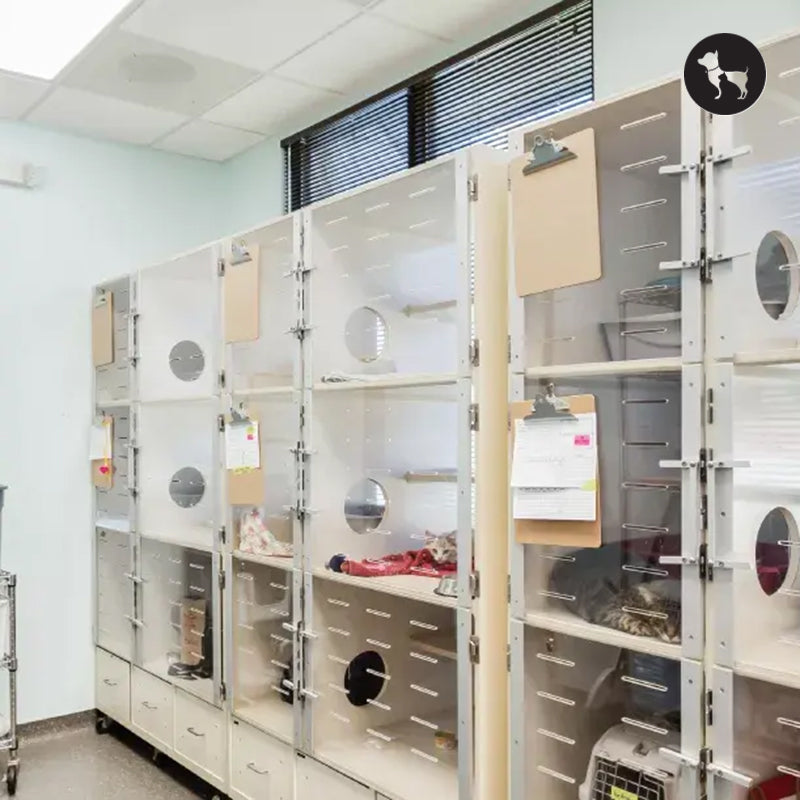
Leaving your cat behind, even for a day, can be nerve-racking. Whether you’re heading out for a quick trip or an extended family wedding, it’s only natural to worry about how your feline will cope without you. Some cat parents rely on family or friends, while others consider professional boarding facilities for extra assurance.
Whichever option you choose, the thought behind it is the same - your cat’s safety, comfort, and calmness. To help you make the best decision, here are 10 important questions every cat parent should ask before finalising a boarding facility.

Before you book your cat’s stay, it’s important to know what really goes on in the boarding facilities. Here are the most crucial questions to ask to ensure your cat feels safe, cared for, and comfortable while you’re away.
Cats are territorial by nature. Facilities that house multiple cats together may create unnecessary stress, especially for shy and anxious ones. Ask if your cat will have a private enclosure or room, ideally with vertical spaces to climb and hide. Individual housing also reduces the exposure to diseases and gives your cat a sense of security.
Cats love consistency and quiet environments on their own. Ask about feeding schedules, playtime, grooming, and resting hours. Facilities that allow a structured yet calm routine help cats settle faster. Bonus points - if they ask for your cat’s routine at home, as it shows they personalise care.
Accidents or sudden illnesses can happen. A responsible boarding facility should have a qualified vet on-call or in-house, along with staff trained in basic first aid and feline behaviour. It’s worth asking how they handle emergencies, medication administration, or chronic conditions.

Cats often feel anxious in new surroundings. A good facility will have stress-reducing practices, such as Feliway diffusers, soft background music, or hiding nooks. Ask if they monitor behaviour changes and how they soothe anxious cats. If they mention techniques like gentle interaction or pheromone sprays, it’s a positive sign.
Familiar scents can make a big difference. Bringing your cat’s favourite blanket, toy, or bed can comfort them. A good boarding centre will encourage this instead of enforcing a sterile, impersonal setup. It’s also helpful to ask if you can bring your cat’s regular food to avoid tummy troubles.
Reputable facilities require up-to-date vaccinations for all cats, including rabies and feline distemper, before check-in. This isn’t just for your cat’s safety, but for every feline and staff member staying there. Ask how they verify records and what happens if another cat falls ill during their stay.
It is a huge deal for cats. Unclean litter trays can lead to stress, avoidance, or even urinary issues. The right facility will clean and refresh litter boxes at least twice a day and use cat-safe litter. Don’t hesitate to ask what type of litter they use, as it really matters.

If your cat has allergies, is on prescription food, or just happens to be a picky eater, you’ll want to know how mealtimes are managed. The best facilities will follow your feeding instructions exactly, including portion sizes and feeding times, along with the type of food you feed your feline. Ask how they store food and whether you can bring your own.
Being able to see your cat’s face, even virtually, can make all the difference. Many facilities now offer photo or video updates, or even live camera access. Ask what their communication policy is, how often you’ll get updates, and through which channels. A transparent boarding service will happily keep you in the loop.
Safety goes beyond locked doors. Check if the facility has escape-proof enclosures, secure windows, temperature control, fire safety systems, and proper ventilation. Cats are sensitive to heat, odours, and noise. Henceforth, a calm, hygienic, and temperature-regulated environment is essential.
Choosing the right cat boarding facility isn’t about picking the fanciest one but about finding a place that truly understands cats. The best centres go beyond care; they create comfort. They notice the little things: a change in appetite, a twitch in the tail, a shift in mood.
If you’re preparing for a trip, make sure your cat has everything they need, from cosy beds to travel carriers, nutritious food, and comforting toys. Heads Up For Tails offers a curated range of cat essentials designed to make every moment, at home or away, calmer and happier.
Explore the collection today and make your feline’s comfort a priority!
It’s best to book at least 2 to 3 weeks in advance, especially during holidays or peak seasons, as good facilities fill up quickly.
Try leaving them for short stays first, pack familiar items, and ensure vaccinations are up-to-date. Gradual exposure helps reduce stress.
Many facilities allow bonded cats to share a room, but only if they get along well and space permits.
Yes, pet hotels often house both dogs and cats, while cat-only boarding facilities provide calmer environments designed specifically for feline comfort.
Some do not, especially for males, due to marking and aggression issues. Always check their policy beforehand.
Give them space, familiar food, and soft interaction. They may sleep more or act distant initially, but it’s just the process of readjustment for them.